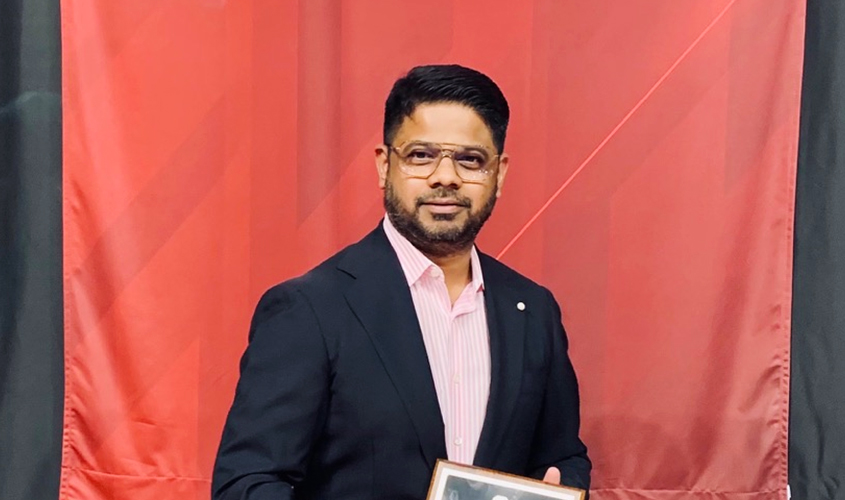Kidney disease progresses silently; in fact, according to the World Kidney Day organization, a person can lose up to 90 percent of their kidney function before experiencing symptoms, and eight to 10 percent of the adult population suffers from some form of kidney damage.
World Kidney Day’s goal is to raise awareness of the importance of our kidneys. This year, the annual campaign takes place on March 9, and the theme is “Kidney Health for All—Preparing for the unexpected, supporting the vulnerable.”
St. George’s University School of Medicine alum Sujit Vijay Sakpal, MD ’05, is a multi-organ abdominal transplant surgeon, intensivist, and kidney and pancreas transplantation director at Avera McKennan Hospital & University Health Center in South Dakota. As a physician who works directly with vulnerable populations impacted by issues such as kidney disease, he shared his thoughts on World Kidney Day and why he chose to focus his career on caring for those with end-stage organ failure.
“Everyone should be aware of kidney disease, especially those with risk factors for it such as diabetes, hypertension, heart disease, obesity, or a family history of kidney disease,” said Dr. Sakpal. “Knowing one is at risk is the first step towards a healthier life.”
For those with high-risk factors such as diabetes, hypertension, or obesity, Dr. Sakpal recommends getting kidney function checked regularly. In addition, to help prevent kidney disease, there are a few daily choices we can all make.
“Keep fit, be active, eat a healthy diet, and stay hydrated. It’s also important to stay mindful of your blood sugar and blood pressure and not smoke or take over-the-counter non-steroidal anti-inflammatory pills regularly,” he said.
Although these seem like small changes, they can significantly impact kidney health. Progressive chronic kidney disease could possibly become end-stage and require dialysis. At this point, Dr. Sakpal would recommend seeking early advice and referral for kidney transplantation, which can potentially restore the quality and longevity of the life of those affected. That’s where Dr. Sakpal’s expertise and care would come in.
A profoundly challenging and rewarding career path
“I always wanted to be a surgeon, but a cardiothoracic one initially,” said Dr. Sakpal when asked how he decided on a career in transplant surgery. “That changed in my surgical residency at Saint Barnabas Medical Center in New Jersey, one of the busiest and top-ranked kidney-pancreas transplantation centers in the US.”
During his surgical residency, Dr. Sakpal learned that solid-organ transplantation goes beyond the craft and skill of surgery. It involves staying up to date with innovations in medicine, immunology, and pharmacotherapy.
“Successful organ transplantation care of complex patients requires a multidisciplinary team effort,” added Dr. Sakpal. “All of it piqued my interest. Exceptional mentorship, both at Barnabas and then at Northwestern Medicine in Chicago during my fellowship in abdominal transplant, helped sculpt and build my professional career.”
The complexity involved in transplant surgery, however, comes with challenges. But those challenges make Dr. Sakpal even more grateful and motivated of how rewarding the work is.
“Reciprocity exists between challenges and rewards in all professions,” said Dr. Sakpal. “Challenges in my profession directly affect the lives of patients who need new organs to survive and live healthier and longer. As one can imagine, caring for patients with end-stage organ failure and optimizing their health to undergo lifesaving and life-changing organ transplantation is profoundly rewarding.”
The importance of a well-rounded medical education
For Dr. Sakpal to get to where he is today, he recognizes the significance of his education and how it prepared him for his future in medicine.
“Every educational experience has been enriching and formative toward building and establishing my professional career thus far,” Dr. Sakpal shared. “From my time as an international student from India at Idaho State University to SGU’s School of Medicine with its high caliber of medical education and opportune clinical rotations that led me to my advanced training as a surgical resident and a fellow, all of it was extraordinarily impactful.”
His education and career have taught Dr. Sakpal about the lifelong journey of practicing clinical medicine and surgery. His advice to students hoping to succeed on a similar path is simple.
“Never cease learning, be adaptive, seek mentorship, find and follow your passion, practice self-care, and most importantly, be humble with successes and never fear failure,” he said.
—Sarah Stoss
